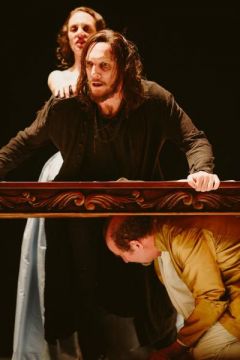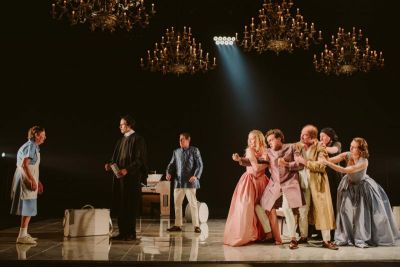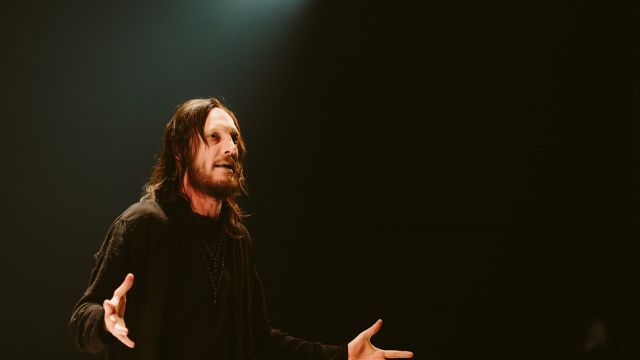Tartuffe
If you seek a light-hearted romp, written with wit and intelligence, this proudly accessible version of Tartuffe should fit the bill – for most of its length, at least. On the other hand, despite a gallery of memorable and effective performances to be found in the ensemble, you may well be disappointed by Tartuffe himself, a figure who proves (at least for this reviewer) more effective when talked about – in admiration, anticipation, or revulsion - by others than when making his own presence felt ‘in the flesh’.
Phillip Kavanagh has served up an adaptation of Moliere’s biting religious hypocrisy satire of the 1600’s that incorporates oblique modern references (a source of hearty laughs on opening night) as well as some vividly surreal verbal comic imagery. Solid humour is generated from the technique of melodramatically inflating a particular situation, then puncturing it for comedic effect.
Director Chris Drummond has paced the proceedings well, and Michael Hankin’s smartly simple set/costume designs – in conjunction with Nigel Levings’ lighting - let the characterisation and dialogue take focus while making the performers look resplendent by association with the glorious chandeliers adorning the Dunstan Playhouse stage. Alan John’s live organ underscore is intelligently used and subtly supportive, while John’s own (brief, elderly, cross-dressing) performance is amusing when not saddled with self-consciously blasphemous, grotesque song lyrics to deliver.
 Paul Blackwell (playing Orgon – not the organ) continues to match his own stellar standard for comic portrayals on the SA stage, while the delightful Jacqy Phillips reaches superb heights of hilarity as Dorine with some of the densest dialogue in the text (an occasional fumble is noticeable but easily glossed over). Guy O’Grady communicates a quiet quirkiness that is most welcome in his performance as Damis, and Astrid Pill is practically perfect in underplaying the part of Elmire while remaining facially expressive to just the extent that her role requires.
Paul Blackwell (playing Orgon – not the organ) continues to match his own stellar standard for comic portrayals on the SA stage, while the delightful Jacqy Phillips reaches superb heights of hilarity as Dorine with some of the densest dialogue in the text (an occasional fumble is noticeable but easily glossed over). Guy O’Grady communicates a quiet quirkiness that is most welcome in his performance as Damis, and Astrid Pill is practically perfect in underplaying the part of Elmire while remaining facially expressive to just the extent that her role requires.
In general, though the actors are well-served by Kavanagh’s text, and they generally serve it well in return, some are less convincing than others. Rachel Burke’s Mariane runs the risk of playing too broadly, too crudely (and cruelly) vacant to be a truly satisfying on-stage persona; she possesses something of the young Nicole Kidman’s presence, without matching her at the level of technique. Burke and Antoine Jelk embody the kind of young would-be couple whom it is very easy to tire of; even if their characters may be intended as a satire on the banality of youth, they’re still a drag to spend time with (in Jelk’s defence, he does reach a certain comic peak toward the end of the play).
Equally problematic, sad to say, is the title character, presented here by Nathan O’Keefe as an arch, spineless, visually blatant travesty of the traditional Christ figure, given to self-aggrandisement and grandly empty gestures. Moliere’s intentions here are already clear enough, but this performance and characterisation make them so obvious and insistent that when Tartuffe himself occupies (or shares) centre stage, he simply becomes an annoyance in his own show.
When O’Keefe attempts, in a direct-to-audience prologue, to put a self-referential spin on the conundrum of being a late arrival in a play bearing your character’s name, the device – which also intends to make explicit the modern parallels and contemporary relevance that this production aims for – is, at best, a mixed success. The louder that Tartuffe wails, the harder it becomes to believe that so many individuals could be taken in by him. Ultimately, despite the energy and flamboyance that O’Keefe delivers in the role, it’s rather more fun to watch (and hear) the surrounding characters talking about, reacting to, and speculating on the ‘magic’ of Tartuffe than it is to actually witness the man himself in the act of casting his ever-more-dubious ‘spells’ over them all.
 Tartuffe ought to have the effect of propelling his own play to new heights, but for this reviewer, he instead has the effect of largely deflating the second act, which is also hampered by the action devolving at times into little more than silly sex-capades that were surely scandalous and thrilling in Moliere’s time but have little substance today. It is left mainly to Rory Walker, a gem of a comic talent in the role of Cleante, to save the day by turning his character’s curious non-sequiturs into sure-fire laugh-getters.
Tartuffe ought to have the effect of propelling his own play to new heights, but for this reviewer, he instead has the effect of largely deflating the second act, which is also hampered by the action devolving at times into little more than silly sex-capades that were surely scandalous and thrilling in Moliere’s time but have little substance today. It is left mainly to Rory Walker, a gem of a comic talent in the role of Cleante, to save the day by turning his character’s curious non-sequiturs into sure-fire laugh-getters.
The ultimate climax of this production turns out to be pure political rabble-rousing rhetoric which, if fully intended to jar the mind and ear at the end of an evening’s entertainment, can be said to have succeeded. Clearly a big chance is being taken here: that you will either be in full agreement and sympathy with the sentiments being expressed, or you will at least grudgingly respect those concerned for their conviction (perhaps it’s possible to feel a bit both ways…?) You will have to make up your own mind as to where you stand with regard to this kind of explicit editorialising.
Despite the misgivings of this reviewer, Tartuffe, as presented here, still has just enough of what it takes to provide a solidly funny, cheeky, inventive, intelligent evening at the theatre. If many of its ambitions remain unrealised, those very ambitions are sometimes gratifying enough, in and of themselves, to make this recommendable.
Anthony Vawser
Photographer: Kate Pardey
Subscribe to our E-Newsletter, buy our latest print edition or find a Performing Arts book at Book Nook.

